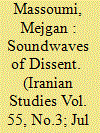| Srl | Item |
| 1 |
ID:
112100


|
|
|
|
|
| Publication |
2012.
|
| Summary/Abstract |
Around the world, we are witnessing new forms of organization, grassroots mobilization, activism and popular uprisings, all seeking democratic change and social justice. These events evoke both optimism and pessimism about our abilities to predict the future of cities in today's Global South. Confronted by a growing landscape of poverty, rising inequality in the global economy and acute socio-spatial polarization, we must ask what accounts for these new patterns. Does the reasoning apply equally to cities worldwide or does it exist only within the context of specific urban geographies? Perhaps the most recent and dramatic transformation within the global urban landscape is the Arab Spring. As people in various parts of the Arab world embark on their quest for self-governance, there is no telling where this great experiment will lead. Based on current indications, religion will play a decisive role in shaping the futures of these nations, and particularly their cities. Our aim in this article is to explore the urban processes by which religious movements transform into fundamentalist ones, and how that process may reshape cities.
|
|
|
|
|
|
|
|
|
|
|
|
|
|
|
|
| 2 |
ID:
185878


|
|
|
|
|
| Summary/Abstract |
In the decades of the 1960s and 1970s, sound recording technologies—including radio and cassettes—proliferated in Afghanistan and reached transnational lengths. While the state came to dominate these technologies, it could not prevent users from circumventing its censors with alternative perspectives and discourses. This article highlights the examples of Farīda ʿUsmān Anwarī, a noted radio announcer, producer, and journalist, and Aḥmad Ẓāhir, Afghanistan's most popular musical icon to date, to showcase the ways in which the Persianate literary canon served as the medium for sounding dissent amid the changing social and political dynamics of the time. Pushing the boundaries of recorded speech created an alternative space where dissent became possible and the strategic use of mass media paved the way for transnational sonic solidarities among a diverse community of listeners across the Persian-speaking world and beyond.
|
|
|
|
|
|
|
|
|
|
|
|
|
|
|
|